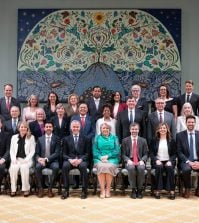Hong Kong’s ‘money no object’ COVID fight; Canada’s pandemic response hiring surge; US DoJ urges government transparency: policy and delivery news in brief

Global Government Forum’s weekly digest of all the news you need to know but might have missed
Hong Kong leader vows to ‘spend whatever money is required’ to maximise civil service deployment amid fifth coronavirus wave
Carrie Lam, the chief executive of Hong Kong, recently said she was willing to spend as much money as necessary and mobilise as many civil servants as possible to overcome the city’s rampant fifth wave of coronavirus infections.
Lam’s fourth briefing in early March followed confirmed cases in the city of more than 27,000, with health officials reporting a record 198 coronavirus-related deaths in a single 24-hour period.
Around 13% of Hong Kong’s civil service workforce had been infected, involving 20,000 staff. Hong Kong’s Civil Service Bureau revised a policy that required all previously recovered civil servants who tested positive again to report for duty. Lam said the requirement was originally implemented because the workforce was needed to keep basic municipal functions running.
“We are not short of money. We will spend whatever money is required to get us out of this epidemic as soon as possible,” she said.
“More importantly, the whole of the Hong Kong government is acting as one government to tackle this epidemic. I can assure you every bureau, every department has been mobilised in this fight against the epidemic.”
Lam added that the virus had undermined public service capacity, in particular the number of cross-border drivers, supermarket staff and healthcare workers. This, she said, had made the effective distribution of resources the city’s “biggest challenge”.
Read more: Hong Kong officials must receive vaccine or fund fortnightly tests
US Justice Department issues guidance to promote transparency
The US Department of Justice has urged federal agencies to promote openness when processing records requested as part of freedom of information.
In a guidance memo circulated to heads of executive departments and agencies concerning the Freedom of Information Act (FOIA), Merrick Garland, the US attorney general, said federal chief FOIA officers must “undertake comprehensive reviews of all aspects of their agencies’ FOIA administration, with a particular focus on the concerns highlighted in this memorandum”.
“I encourage each agency head to provide regular and proper training to your workforce that explains the importance of FOIA and every individual’s role in administering it,” he added.
The guidance builds on ex-president Barrack Obama’s goal of a “presumption of openness”, which was written into a law signed in 2016. Information from the Government Accountability Office (GAO) however showed that agencies’ use of certain FOIA exemptions authorising them to deny record requests had more than doubled between fiscal year 2012 and 2019. This occurred while the number of FOIA requests processed rose by 32%.
Vanita Gupta, associate attorney and the DoJ’s chief FOIA officer, said the memo underscored the department’s commitment to a “government that is open, transparent and accountable to the people we serve”.
“The Office of Information Policy looks forward to working with agencies to ensure the presumption of openness is applied across the government,” she added.
Read more: Internet freedom in sharp decline, watchdog warns
Canadian COVID response sparks hiring surge
The Canadian federal government’s response to the coronavirus pandemic prompted it to increase its headcount by 20,000 workers in a year, according to data from the Treasury Board.
Employment across all departments and agencies rose by more than 6% between the first three months of 2020 and the same period in 2021, growing to 319,600. However, around half of these jobs were taken in by just three departments and agencies.
These agencies included the Public Health Agency of Canada, which grew its staffing levels by 40% in the first year of the pandemic. Others included the Employment and Social Development Department and the Canada Revenue Agency, which increased employment by 21% and 5.3% respectively, reaching a combined extra headcount of around 8,000. Both agencies worked together to design and deliver urgent benefit payments systems for Canadians.
Health Canada by contrast saw a drop in its employment levels of 18% in fiscal year 2021. It attributed this to the transfer of one of its units to another agency, Indigenous Services Canada, which recorded a 23% jump in employment.
For fiscal year 2021, the federal government’s total payroll reached nearly CAN$60bn (US$47.7bn), an increase of CAN$4.4bn (US$3.5bn) from the previous year, according to the public accounts.
Read more: Canada to put unvaccinated federal workers on unpaid leave
Australia’s media regulator set for new powers to tackle internet misinformation
Australia’s media regulator could force internet companies to share data about how they treat misinformation and disinformation under new laws that could come into effect later this year.
The plan to give the Australian Communications and Media Authority (ACMA) the power to impose an industry code on Big Tech was set out by Paul Fletcher, Australia’s communications minister, who said that “digital platforms must take responsibility for what is on their sites and take action when harmful or misleading content appears”.
Fletcher said that legislation could be introduced later this year to five the watchdog powers to require tech companies to share information on how they treat misinformation.
Australia faces an federal election in May this year. Based on current polls, it is suggested Australia’s ruling conservative government could lose, meaning the implementation of the law may fall to the opposition Labor party. However, according to a report by Reuters, Michelle Rowland, spokesperson for Labor’s shadow communications minister, said the opposition supported expanding ACMA’s powers.
Read more: Australia’s media regulator set for powers to tackle internet misinformation






















